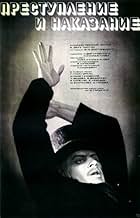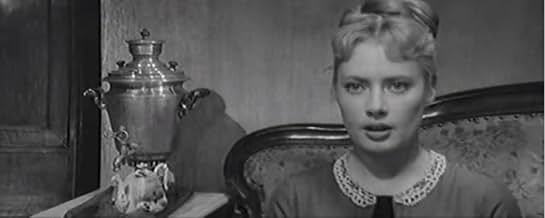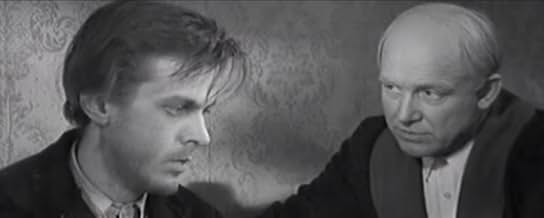Raskolnikov, an impoverished ex-student, kills a pawnbroker and her sister. Police suspect him after his outbursts. His family arrives, followed by suitors. He befriends a clerk's daughter, ... Read allRaskolnikov, an impoverished ex-student, kills a pawnbroker and her sister. Police suspect him after his outbursts. His family arrives, followed by suitors. He befriends a clerk's daughter, Sonia, a prostitute who urges him to confess.Raskolnikov, an impoverished ex-student, kills a pawnbroker and her sister. Police suspect him after his outbursts. His family arrives, followed by suitors. He befriends a clerk's daughter, Sonia, a prostitute who urges him to confess.
- Marmeladov
- (as Yevgeniy Lebedev)
- Pyotr Luzhin
- (as V. Basov)
- Dmitriy Razumikhin
- (as A. Pavlov)
- Alyona Ivanovna
- (as Ye.Yevstratovna)
- Yelizaveta Ivanovna
- (as L. Sokolova)
- Nastasya
- (as I. Makarova)
- Zametov
- (as V. Nosik)
- Lebezyatnikov
- (as Yu. Medvedev)
- Zosimov
- (as Ye. Lazarev)
- Ilya Petrovich - poruchik 'Porokh'
- (as Yu. Sarantsev)
- Nikodim Fomich
- (as Yu. Volkov)
- Director
- Writers
- All cast & crew
- Production, box office & more at IMDbPro
This being said, I usually have a fondness for adaptations of this novel, just like I have toward adaptations of Shakespeare's Hamlet or MacBeth. Even if the films are not masterful, they might still greatly benefit from the source material and stand out above average. The version by Sternberg and Peter Lorre is comically short, but has a certain charm. The same goes for the modernized treatment of Finnish director Aki Kaurismäki. Just because adapting Dostoevsky is hard, doesn't mean you can't try it.
This adaptation, by director Lev Kulidzhanov, is often hailed as one of the best "Crime and Punishment" adaptations. And it is very good. Due to the lengthy duration clocking in at almost four hours, this film has time for proper character development and thorough depiction of Raskolnikov's agony. And the visuals of the whole thing serve it great. This film is black and white, but most often it's really nothing but gray in its color palette, making it feel like a fever dream that refuses to end. It's dead calm and tormenting, which fits the novel perfectly.
The lack of a novel-like storyteller in a movie is fixed by giving the characters long monologues and dialogues, that can last small eternities. This really adds some feel of the book to the film. There are minor differences and things omitted from film, but this is always the case with adaptations, and not against the law. If some versions show Raskolnikov commit his crime mostly because of his Nietzche-like super-mensch theories, this adaptation stresses the financial difficulties that he faces. I love the look of his apartment in this film, with his living quarters being much smaller than in some western adaptations. When the protagonist has visitors, which is nearly always, it feels like they are really pressing towards his skin. This film is very claustrophobic.
My favorite character in this adaptation, and in most adaptations, is Porfiri, who is played in quiet determination by Innokentiy Smoktunovskiy. This was my favorite performance in the film, the character is sparingly used and many of his lines are kept in tact from the novel. The Raskolnikov in this version is one of the most distant, and least-relatable I have seen in any film. This might have to do with the subtle way, that the lead performance has been written and directed. He has many great scenes too.
In conclusion, in all areas of film-making, this Soviet film has merits to it. Though it's not perfect, and no adaption can beat the book, it's dark, ambitious, made with determination and appreciation for the source text.
- topitimo-829-270459
- Sep 30, 2019
- Permalink
Storyline
Did you know
- TriviaTatyana Bedova's debut.
- Quotes
Porfiriy Petrovich: I was especially interested in a point you made toward the end. That certain individuals even have the right to break the law and commit all sorts of crimes. That the laws were not made for them. He says all humanity is divided into ordinary men and into supermen. The ordinary men must obey laws, because they're ordinary. And the supermen have the right to break the law. That's what the article says. Am I right?
- ConnectionsFeatured in Legendy mirovogo kino: Inna Makarova
- How long is Crime and Punishment?Powered by Alexa
Details
- Release date
- Country of origin
- Official site
- Language
- Also known as
- Crime and Punishment
- Production companies
- See more company credits at IMDbPro
- Runtime3 hours 41 minutes
- Color
- Sound mix
- Aspect ratio
- 2.35 : 1
Contribute to this page



































